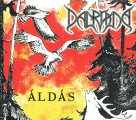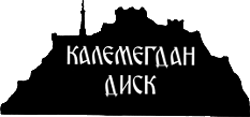Information
Shop
Search
Catalog
- Recommendations
- Coming soon
- New in stock
- Back in stock
- ABC-Lists CDs
- ABC-Lists LPs
- List of all items CDs
- List of all items LPs
Order

Dalriada
Áldás
- Format: CD
- Band: Dalriada
- Title: Áldás
- Band's Origin: HU
- Style: Folk Metal, male & female vocals
- Rating: 4
- Release Year: 2015
- Recording Year: 2015
- Production Year: 2015
- Record Company: Nail Records
- Item's Number: NAILCD 242
- Color of the Label:
- Edition:
- Extras: digipak
- EAN: 5999505138934
- Weight: 63 g
- Visual: new
- Acoustic:
- Cover: new
Rock Diszkont Release Information
Hungary’s most popular and well-known folk metal band with soaring male and gracious female vocals, epic choirs and perfect balance between folk and metal instrumentation.
Dalriada (formerly Echo of Dalriada) has been a Hungarian folk metal band. Its predecessor Steelium was formed in 1998 in Sopron and had been renamed into Echo of Dalriada in February 2003. This name was shortened to Dalriada with their third album “Kikelet” in 2007.
“Áldás” (The Blessing), their 8th album, released in September 2015, is the sequel to the 2012 album “Napisten hava” (Sun God’s Eve).
Guitarist & singer András Ficzek, the main songwriter, presents the songs of the album:
“Amit ad az ég (Álmos búcsúja)” (As the Sky Gives (Sleepy Farewell))
“The first song to be presented from the album “Áldás” (The Blessing) is a lyrical reworking of an ancient Hungarian legend about how the leader of the Hungarian tribes, Álmos, did not enter the land of Pannonia until the conquest of Hungary, so he was no longer a leader at the time of the actual conquest. This fact is explained in different ways by different historical sources, the reason could have been the murder of a prince for sacral purposes, or suicide for similar reasons, or death in battle.
In my version, on the night immediately preceding the march to the Carpathian Basin, the leader Álmos goes around the campfires talking to his men and says goodbye, so the final question remains open. In any case, it is a fact that the ruler of the Hungarian tribes invading the Carpathian Basin was already Álmos’ son, Árpád the leader.
The song deals with the farewell of Álmos in dialogue form. Musically, it is a mid-tempo, melodic movement with a strong chorus and folk music influenced outtakes. ”
“Dózsa rongyosa (Doge’s rags)”
“The text here works with strong mood-painting imagery and deals mainly with the antecedents and the first period of the peasant uprising. Musically, it reminds me a bit of the earlier albums, around the “Arany-album” (Gold Album). There is also an alternating guitar-synth solo, and the last minute is pure folk music, with a very slightly modified lyric compared to the original folk song. It’s a good little up-tempo melodic item, and we have been playing it at parties since the summer.”
“Úri toborzó” (Gentlemen Recruiter)
“A continuation of the previous song, but also a completely independent movement, which deals with the failure of the peasant uprising and the subsequent retaliation, and in the chorus the disaster of Mohács is also mentioned tangentially, with its known consequences. The lyrics have become a great favourite of mine, I just love singing them. I think it will become a regular part of the concert programme at our longer solo parties in the future.
Musically it’s a more expansive, longer song with lots of little tidbits, worth listening to with an ear. Here you can hear the guitar solo of Töfi, the boss of the Denevér Studio, in the middle of the song, for which I would like to thank him!”
“Áldás” (The Blessing)
“One of the first songs on the album, its lyrics deal with the cycle of birth and death, and its music is an impressive, mid-tempo, pulling piece with one of my favourite choruses from the album. Adam on the brass, as on the whole album, is a huge performer here.”
“Világfa” (World Tree)
“Our little ”Gamma Ray” song!' (laughs). This song was very difficult to put together, it was taken apart several times, given a new middle part, new lyrics and a new verse base, but it just came together. Adam’s homemade medieval bagpipe was the key to the song; when I heard the sound of it, the melody of the verze started to play in my head, and from there it was easy.
The song is about the birth of the world tree, which symbolizes the world, so it is about the creation of the world, based on old tales and legends. My favourite part of the song is the early music insert in the middle, I think it’s very well done.”
“Zivatar” (Thunderstorm)
“The hard rock song of the album, with lots of Hammond, and heavy lyrics that can be interpreted on many levels. I will say this much, the chorus is the key to deciphering the meaning of the song. Cynical, disillusioned lyrics with strong personal references, but obviously everyone can take what he wants from it.
The music is very refreshingly a little different to what we are used to, and the rocking in the middle of the song with Matyi’s oversolo is just lovely!”
“Moldvageddon” (Moldvageddon)
“The song is based on a popular Moldavian goat that is often covered, we can already do that with Adam. It is completely authentic in its arrangement and instrumentation, but we have tweaked a few things to suit our own ideas. A little demonstration of what we consider to be a sophisticated folk music arrangement these days!”
“Hamu és gyász” (Ashes and Mourning)
“The lyrics and some of the themes of the song had been around for a long time, but somehow the song had just reached the stage where we were putting it together and putting it on record. I love this song, it’s an old favourite. I would also like to point out Matyi’s incredible one and a half minute solo, it gives the song an incredible kick, as does Szög’s Hammond solo. Stylistically, it’s absolutely ancient Dalriada, from around the “Jégbontó” (Icebreaker) album.”
“Futóbetyár” (Treadmill)
“Admittedly a track along the lines of late Dalriada songs, starring the Fajkusz Band, and with lyrics with an outlaw-boy theme. The chorus of the song is something we haven’t done before, but interestingly it fits into the musical setting. The fast folk themes and banging lyrics make it a sure concert favourite.”
“Fele zivatar” (Half Thunderstorm)
“An acoustic version of “Zivatar” (Thunderstorm), this is my own little personal contribution to the album! Interestingly, this acoustic version was done first, so the metal version was written from that. In fact, of all the songs on the record, this was the first one that was done.”
Line-up:
Laura Binder: flute, vocals
András Ficzek: guitar, vocals
Mátyás Németh-Szabó: lead guitar
Gergely “Szög” Szabó: keyboards
István Molnár: bass guitar
Tadeusz Rieckmann: drums, vocals
Ádám Csete: bagpipes, wind instruments
Fajkusz Banda:
Attila Fajkusz: violin, vocals
Gergely Szőke: viola, cobos, acoustic guitar
Ernő Szőke: double bass, percussion, vocals
Guests:
Béla Boross: vocals
Dániel Szebényi: vocals
Péter Schrott: vocals
Gábor Nagy: vocals
Zoltán Cserfalvi: lead guitar
Tracklist
1. Intro 1:43
2. Amit ad az ég (Álmos búcsúja) 4:42
3. Dózsa rongyosa 6:08
4. Úri toborzó 7:10
5. Áldás 4:52
6. Világfa 4:42
7. Zivatar 4:44
8. Moldvageddon 3:34
9. Hamu és gyász 5:51
10. Futóbetyár 5:50
11. Fele zivatar 4:19


